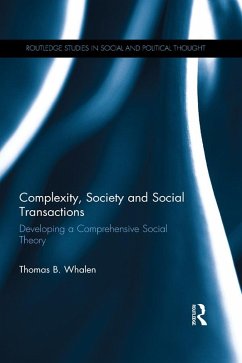Thomas Whalen
Complexity, Society and Social Transactions (eBook, ePUB)
Developing a Comprehensive Social Theory
45,95 €
45,95 €
inkl. MwSt.
Sofort per Download lieferbar

23 °P sammeln
45,95 €
Als Download kaufen

45,95 €
inkl. MwSt.
Sofort per Download lieferbar

23 °P sammeln
Jetzt verschenken
Alle Infos zum eBook verschenken
45,95 €
inkl. MwSt.
Sofort per Download lieferbar
Alle Infos zum eBook verschenken

23 °P sammeln
Thomas Whalen
Complexity, Society and Social Transactions (eBook, ePUB)
Developing a Comprehensive Social Theory
- Format: ePub
- Merkliste
- Auf die Merkliste
- Bewerten Bewerten
- Teilen
- Produkt teilen
- Produkterinnerung
- Produkterinnerung

Bitte loggen Sie sich zunächst in Ihr Kundenkonto ein oder registrieren Sie sich bei
bücher.de, um das eBook-Abo tolino select nutzen zu können.
Hier können Sie sich einloggen
Hier können Sie sich einloggen
Sie sind bereits eingeloggt. Klicken Sie auf 2. tolino select Abo, um fortzufahren.

Bitte loggen Sie sich zunächst in Ihr Kundenkonto ein oder registrieren Sie sich bei bücher.de, um das eBook-Abo tolino select nutzen zu können.
Drawing on a range of theoretical approaches from across the social sciences, this book contends that society, culture, and economy are emergent from social and environmental transaction and negotiation. With each transaction comes renegotiation, however small, and thus the continuous reconstruction of society in the specious present, with practices, beliefs and traditions becoming part of the accepted canon of a group through continual renegotiation, and deviations from the canon being managed through narrative.
- Geräte: eReader
- mit Kopierschutz
- eBook Hilfe
- Größe: 1.21MB
Andere Kunden interessierten sich auch für
![The Provoked Economy (eBook, ePUB) The Provoked Economy (eBook, ePUB)]() Fabian MuniesaThe Provoked Economy (eBook, ePUB)38,95 €
Fabian MuniesaThe Provoked Economy (eBook, ePUB)38,95 €![The Political Sociology and Anthropology of Evil: Tricksterology (eBook, ePUB) The Political Sociology and Anthropology of Evil: Tricksterology (eBook, ePUB)]() Agnes HorvathThe Political Sociology and Anthropology of Evil: Tricksterology (eBook, ePUB)41,95 €
Agnes HorvathThe Political Sociology and Anthropology of Evil: Tricksterology (eBook, ePUB)41,95 €![Talcott Parsons on Economy and Society (RLE Social Theory) (eBook, ePUB) Talcott Parsons on Economy and Society (RLE Social Theory) (eBook, ePUB)]() Bryan S. TurnerTalcott Parsons on Economy and Society (RLE Social Theory) (eBook, ePUB)45,95 €
Bryan S. TurnerTalcott Parsons on Economy and Society (RLE Social Theory) (eBook, ePUB)45,95 €![Max Weber's Sociology of Civilizations: A Reconstruction (eBook, ePUB) Max Weber's Sociology of Civilizations: A Reconstruction (eBook, ePUB)]() Stephen KalbergMax Weber's Sociology of Civilizations: A Reconstruction (eBook, ePUB)38,95 €
Stephen KalbergMax Weber's Sociology of Civilizations: A Reconstruction (eBook, ePUB)38,95 €![Explaining Global Poverty (eBook, ePUB) Explaining Global Poverty (eBook, ePUB)]() Branwen Gruffydd JonesExplaining Global Poverty (eBook, ePUB)45,95 €
Branwen Gruffydd JonesExplaining Global Poverty (eBook, ePUB)45,95 €![Post-Truth Society (eBook, ePUB) Post-Truth Society (eBook, ePUB)]() Arpad SzakolczaiPost-Truth Society (eBook, ePUB)38,95 €
Arpad SzakolczaiPost-Truth Society (eBook, ePUB)38,95 €![Perspectives in Sociology (eBook, ePUB) Perspectives in Sociology (eBook, ePUB)]() E. C. CuffPerspectives in Sociology (eBook, ePUB)45,95 €
E. C. CuffPerspectives in Sociology (eBook, ePUB)45,95 €-
-
-
Drawing on a range of theoretical approaches from across the social sciences, this book contends that society, culture, and economy are emergent from social and environmental transaction and negotiation. With each transaction comes renegotiation, however small, and thus the continuous reconstruction of society in the specious present, with practices, beliefs and traditions becoming part of the accepted canon of a group through continual renegotiation, and deviations from the canon being managed through narrative.
Dieser Download kann aus rechtlichen Gründen nur mit Rechnungsadresse in A, B, BG, CY, CZ, D, DK, EW, E, FIN, F, GR, HR, H, IRL, I, LT, L, LR, M, NL, PL, P, R, S, SLO, SK ausgeliefert werden.
Produktdetails
- Produktdetails
- Verlag: Taylor & Francis
- Seitenzahl: 182
- Erscheinungstermin: 27. September 2017
- Englisch
- ISBN-13: 9781351717762
- Artikelnr.: 49355874
- Verlag: Taylor & Francis
- Seitenzahl: 182
- Erscheinungstermin: 27. September 2017
- Englisch
- ISBN-13: 9781351717762
- Artikelnr.: 49355874
- Herstellerkennzeichnung Die Herstellerinformationen sind derzeit nicht verfügbar.
Thomas B. Whalen is Assistant Professor of Business in the Business and Economics Department at Massachusetts College of Liberal Arts, USA.
List of Tables
List of Figures
Preface. Why Do We Need Another Social Theory? Acknowledgments Chapter 1. An invitation to a social journey Where Have We Been? What is the Question? Where am I Taking You? Overview of the Book
Part I: Laying the Foundation
Chapter 2. Philosophy of Science
The Validity of Social Science
Explaining Human Experience
Critical Realism
Chapter 3. A Rubric for Evaluating Social Theory
The Epistemological Continuum
Objectivism
Subjectivism
Critical Realism
Constructionism
The Ontological Continuum
The Applicability Continuum
Agency
Interaction
System
Structure
Plausibility
Mechanism
My Assumptions
Chapter 4. Scientific Method and Theory
Scientific Paradigms
Theoretical Methods
Thought Experiments
Chapter 5. Other Building Blocks
Limitations
Initial Definitions
Culture
Adaptation versus Evolution
Ethics and Morality
Chapter 6. Situating the Theory
Reflective Human Consciousness
Consciousness as Emergent Process
Awareness and Self-awareness
Consciousness and Temporality
Reflection
Sociality
The Unity of Conscious Experience
Human Experience
Initial Mediations
Socially Constructed Mediations
The Environment
Situating the Theory
Part II. Developing a Theory of Social Ontology
Chapter 7. Complex Adaptive Systems
Nonadaptive versus Adaptive Systems
Chaos Theory
Dissipative Structures
Complex Adaptive and Nonadaptive Systems
Complex Adaptive Systems
Chapter 8. Emergence Theory
Defining Emergence
Mead's Emergence Theory
Social Phenomena as Emergents
Complexity-Based Emergence Theory
Chapter 9. Applicable Social Theory
Mead and Social Interaction
Self and Mind
Past Experience and Contemplation of the Future
Giddens and Structuration
Needs and Motivation
Maslow's Hierarchy of Needs
Chapter 10. Dewey and Bentley's Transactional Approach
Emirbayer and relational sociology Chapter 11. Negotiation
Negotiated Order Theory
and Game Theory
Negotiation
Game Theory
John Nash
Thomas Schelling
Cooperation v. Non-cooperation
Folk theorem
Negotiated Order Theory
Chapter 12. Meaning
Meaning Making
Language
and Symbols
Definitions
Peirce
Signs
and Semeiotics
Mead and the Significant Symbol
Ricoeur's Interpretation Theory
Narrative and Meaning as Social Canon
Chapter 13. Environmental Considerations
Ecological Anthropology
Ecological Psychology
Chapter 14. A Theory of Social Ontology
A General Social Theory
Complex Adaptive Systems Repositioned
Adding Social Transaction
Adding Negotiation and Emergence
Meaning and Negotiation
Structuration
Narrative and Folk Psychology
A Thought Experiment
Chapter 15. Applying the Theory in the Practical World
The Theory's Relationship to Social Systems and Structure
Explaining Social Power
Implications for Culture Study
Ontological Implications in Economic Theory
Rules and Rule Making
The Golden Rule and Reciprocity
Social Contract Theory
The Relationship to Political Organization
Ontological Implications in Moral Philosophy
Moral Realism
Moral Relativism Implications for Moral Philosophy Chapter 16. Conclusions and Further Research Significance for Leadership and Management
Further Research
Closing Thoughts References Index
List of Figures
Preface. Why Do We Need Another Social Theory? Acknowledgments Chapter 1. An invitation to a social journey Where Have We Been? What is the Question? Where am I Taking You? Overview of the Book
Part I: Laying the Foundation
Chapter 2. Philosophy of Science
The Validity of Social Science
Explaining Human Experience
Critical Realism
Chapter 3. A Rubric for Evaluating Social Theory
The Epistemological Continuum
Objectivism
Subjectivism
Critical Realism
Constructionism
The Ontological Continuum
The Applicability Continuum
Agency
Interaction
System
Structure
Plausibility
Mechanism
My Assumptions
Chapter 4. Scientific Method and Theory
Scientific Paradigms
Theoretical Methods
Thought Experiments
Chapter 5. Other Building Blocks
Limitations
Initial Definitions
Culture
Adaptation versus Evolution
Ethics and Morality
Chapter 6. Situating the Theory
Reflective Human Consciousness
Consciousness as Emergent Process
Awareness and Self-awareness
Consciousness and Temporality
Reflection
Sociality
The Unity of Conscious Experience
Human Experience
Initial Mediations
Socially Constructed Mediations
The Environment
Situating the Theory
Part II. Developing a Theory of Social Ontology
Chapter 7. Complex Adaptive Systems
Nonadaptive versus Adaptive Systems
Chaos Theory
Dissipative Structures
Complex Adaptive and Nonadaptive Systems
Complex Adaptive Systems
Chapter 8. Emergence Theory
Defining Emergence
Mead's Emergence Theory
Social Phenomena as Emergents
Complexity-Based Emergence Theory
Chapter 9. Applicable Social Theory
Mead and Social Interaction
Self and Mind
Past Experience and Contemplation of the Future
Giddens and Structuration
Needs and Motivation
Maslow's Hierarchy of Needs
Chapter 10. Dewey and Bentley's Transactional Approach
Emirbayer and relational sociology Chapter 11. Negotiation
Negotiated Order Theory
and Game Theory
Negotiation
Game Theory
John Nash
Thomas Schelling
Cooperation v. Non-cooperation
Folk theorem
Negotiated Order Theory
Chapter 12. Meaning
Meaning Making
Language
and Symbols
Definitions
Peirce
Signs
and Semeiotics
Mead and the Significant Symbol
Ricoeur's Interpretation Theory
Narrative and Meaning as Social Canon
Chapter 13. Environmental Considerations
Ecological Anthropology
Ecological Psychology
Chapter 14. A Theory of Social Ontology
A General Social Theory
Complex Adaptive Systems Repositioned
Adding Social Transaction
Adding Negotiation and Emergence
Meaning and Negotiation
Structuration
Narrative and Folk Psychology
A Thought Experiment
Chapter 15. Applying the Theory in the Practical World
The Theory's Relationship to Social Systems and Structure
Explaining Social Power
Implications for Culture Study
Ontological Implications in Economic Theory
Rules and Rule Making
The Golden Rule and Reciprocity
Social Contract Theory
The Relationship to Political Organization
Ontological Implications in Moral Philosophy
Moral Realism
Moral Relativism Implications for Moral Philosophy Chapter 16. Conclusions and Further Research Significance for Leadership and Management
Further Research
Closing Thoughts References Index
List of Tables
List of Figures
Preface. Why Do We Need Another Social Theory? Acknowledgments Chapter 1. An invitation to a social journey Where Have We Been? What is the Question? Where am I Taking You? Overview of the Book
Part I: Laying the Foundation
Chapter 2. Philosophy of Science
The Validity of Social Science
Explaining Human Experience
Critical Realism
Chapter 3. A Rubric for Evaluating Social Theory
The Epistemological Continuum
Objectivism
Subjectivism
Critical Realism
Constructionism
The Ontological Continuum
The Applicability Continuum
Agency
Interaction
System
Structure
Plausibility
Mechanism
My Assumptions
Chapter 4. Scientific Method and Theory
Scientific Paradigms
Theoretical Methods
Thought Experiments
Chapter 5. Other Building Blocks
Limitations
Initial Definitions
Culture
Adaptation versus Evolution
Ethics and Morality
Chapter 6. Situating the Theory
Reflective Human Consciousness
Consciousness as Emergent Process
Awareness and Self-awareness
Consciousness and Temporality
Reflection
Sociality
The Unity of Conscious Experience
Human Experience
Initial Mediations
Socially Constructed Mediations
The Environment
Situating the Theory
Part II. Developing a Theory of Social Ontology
Chapter 7. Complex Adaptive Systems
Nonadaptive versus Adaptive Systems
Chaos Theory
Dissipative Structures
Complex Adaptive and Nonadaptive Systems
Complex Adaptive Systems
Chapter 8. Emergence Theory
Defining Emergence
Mead's Emergence Theory
Social Phenomena as Emergents
Complexity-Based Emergence Theory
Chapter 9. Applicable Social Theory
Mead and Social Interaction
Self and Mind
Past Experience and Contemplation of the Future
Giddens and Structuration
Needs and Motivation
Maslow's Hierarchy of Needs
Chapter 10. Dewey and Bentley's Transactional Approach
Emirbayer and relational sociology Chapter 11. Negotiation
Negotiated Order Theory
and Game Theory
Negotiation
Game Theory
John Nash
Thomas Schelling
Cooperation v. Non-cooperation
Folk theorem
Negotiated Order Theory
Chapter 12. Meaning
Meaning Making
Language
and Symbols
Definitions
Peirce
Signs
and Semeiotics
Mead and the Significant Symbol
Ricoeur's Interpretation Theory
Narrative and Meaning as Social Canon
Chapter 13. Environmental Considerations
Ecological Anthropology
Ecological Psychology
Chapter 14. A Theory of Social Ontology
A General Social Theory
Complex Adaptive Systems Repositioned
Adding Social Transaction
Adding Negotiation and Emergence
Meaning and Negotiation
Structuration
Narrative and Folk Psychology
A Thought Experiment
Chapter 15. Applying the Theory in the Practical World
The Theory's Relationship to Social Systems and Structure
Explaining Social Power
Implications for Culture Study
Ontological Implications in Economic Theory
Rules and Rule Making
The Golden Rule and Reciprocity
Social Contract Theory
The Relationship to Political Organization
Ontological Implications in Moral Philosophy
Moral Realism
Moral Relativism Implications for Moral Philosophy Chapter 16. Conclusions and Further Research Significance for Leadership and Management
Further Research
Closing Thoughts References Index
List of Figures
Preface. Why Do We Need Another Social Theory? Acknowledgments Chapter 1. An invitation to a social journey Where Have We Been? What is the Question? Where am I Taking You? Overview of the Book
Part I: Laying the Foundation
Chapter 2. Philosophy of Science
The Validity of Social Science
Explaining Human Experience
Critical Realism
Chapter 3. A Rubric for Evaluating Social Theory
The Epistemological Continuum
Objectivism
Subjectivism
Critical Realism
Constructionism
The Ontological Continuum
The Applicability Continuum
Agency
Interaction
System
Structure
Plausibility
Mechanism
My Assumptions
Chapter 4. Scientific Method and Theory
Scientific Paradigms
Theoretical Methods
Thought Experiments
Chapter 5. Other Building Blocks
Limitations
Initial Definitions
Culture
Adaptation versus Evolution
Ethics and Morality
Chapter 6. Situating the Theory
Reflective Human Consciousness
Consciousness as Emergent Process
Awareness and Self-awareness
Consciousness and Temporality
Reflection
Sociality
The Unity of Conscious Experience
Human Experience
Initial Mediations
Socially Constructed Mediations
The Environment
Situating the Theory
Part II. Developing a Theory of Social Ontology
Chapter 7. Complex Adaptive Systems
Nonadaptive versus Adaptive Systems
Chaos Theory
Dissipative Structures
Complex Adaptive and Nonadaptive Systems
Complex Adaptive Systems
Chapter 8. Emergence Theory
Defining Emergence
Mead's Emergence Theory
Social Phenomena as Emergents
Complexity-Based Emergence Theory
Chapter 9. Applicable Social Theory
Mead and Social Interaction
Self and Mind
Past Experience and Contemplation of the Future
Giddens and Structuration
Needs and Motivation
Maslow's Hierarchy of Needs
Chapter 10. Dewey and Bentley's Transactional Approach
Emirbayer and relational sociology Chapter 11. Negotiation
Negotiated Order Theory
and Game Theory
Negotiation
Game Theory
John Nash
Thomas Schelling
Cooperation v. Non-cooperation
Folk theorem
Negotiated Order Theory
Chapter 12. Meaning
Meaning Making
Language
and Symbols
Definitions
Peirce
Signs
and Semeiotics
Mead and the Significant Symbol
Ricoeur's Interpretation Theory
Narrative and Meaning as Social Canon
Chapter 13. Environmental Considerations
Ecological Anthropology
Ecological Psychology
Chapter 14. A Theory of Social Ontology
A General Social Theory
Complex Adaptive Systems Repositioned
Adding Social Transaction
Adding Negotiation and Emergence
Meaning and Negotiation
Structuration
Narrative and Folk Psychology
A Thought Experiment
Chapter 15. Applying the Theory in the Practical World
The Theory's Relationship to Social Systems and Structure
Explaining Social Power
Implications for Culture Study
Ontological Implications in Economic Theory
Rules and Rule Making
The Golden Rule and Reciprocity
Social Contract Theory
The Relationship to Political Organization
Ontological Implications in Moral Philosophy
Moral Realism
Moral Relativism Implications for Moral Philosophy Chapter 16. Conclusions and Further Research Significance for Leadership and Management
Further Research
Closing Thoughts References Index







